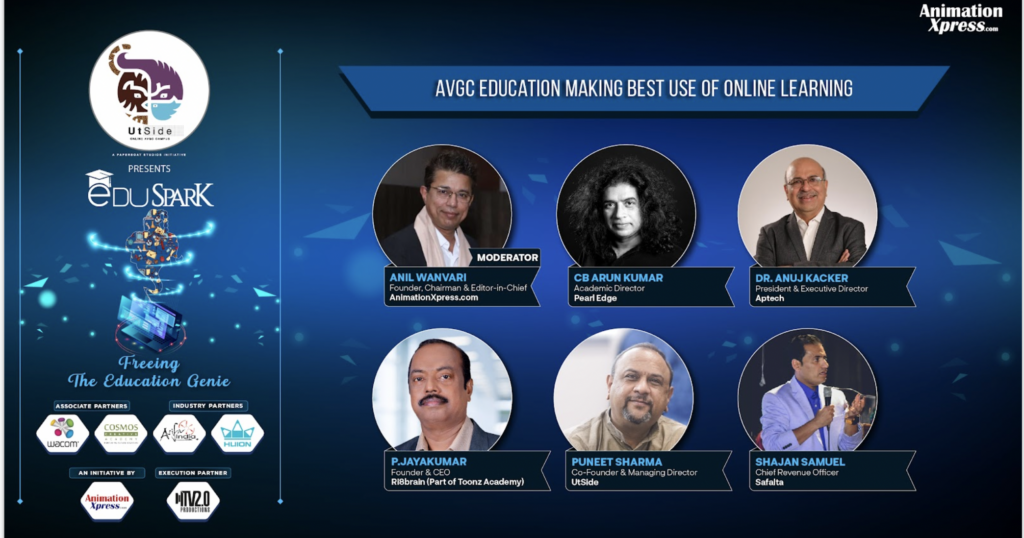
The first day of the EduSpark Summit witnessed the panel discussion on ‘AVGC making best use of online learning’, where the speakers highlighted various points on how online learning brought revolution in the field of AVGC education, and virtual education made it possible to reach diverse students with good quality teachers.
The eminent speakers included Aptech president and executive director Dr. Anuj Kacker, Ri8brain (Part of Toonz Academy) founder and CEO P.Jayakumar, Pearl Edge academic director CB Arun Kumar, UtSide co-founder and managing director Puneet Sharma, Safalta chief revenue officer Shajan Samuel and was moderated by AnimationXpress founder, chairman and editor-in-chief Anil Wanvari.
Kickstarting the discussion, Kacker shared how during pandemic people were forced to adopt the online session. He shared, “The online learning concept was not new, it had its limitations and had a very specific target focus, but the pandemic had broadened the system and people were forced to adapt to online learning. We have more than 800 centers located in more than 30 countries. All these centers use technology to deliver the learning process. For example all our books are available in augmented reality and are dispensed in pdf formats. Learning by visualisation is very effective and today augmented reality paves way for the students to enhance their learning.”
He also added how the online revolution made the recruiting process very simple. Aptech has a platform named Creosouls where the students can upload their works, and it can be accessed by the recruiters. It is very beneficial for the students to benchmark their work and gives them an opportunity to compare with other students from similar backgrounds. Aptech consists of about 30,000 to 40,000 students and more than three lakh work is listed on the portal.
Jayakumar talked about the skill gap in the industry and also about how Toonz ventured into online education to reach a diverse group of students. He said, “We have more than two decades of experience in offline training, and we have tried to expand this model and switched to franchise but we are not happy with the outcome because of the quality. The major problem we faced in physical training is lack of skilled trainers. But when the pandemic occurred, as a studio we worked remotely and delivered our projects timely. So if working remotely is possible then delivery of education is also possible. This made us expand our venture and reach students with good quality teachers.”
He also mentioned how the online learning technology has raised the standard of AVGC education by connecting students to highly skilled industry professionals and trainers. There are numerous seminars, webinars, and master classes happening, which gives the flexibility to students to attend it from any corner of the world.
The panelists also highlighted that certain courses need face-to-face interaction and physical training which cannot be replaced by online training anytime.
Highlighting the success of Safalta, Samuel shared, “Safalta has started as a brick and mortar training program, but we quickly pivoted to online during April 2020, during covid. We have three segments: test prep, academics and skills. We have started skills training in graphic design, digital marketing and more. Our programs are economically priced and we cater to the bottom of the pyramid. We conduct 100 per cent live interactive classes and not self paced learning. And the students have lifetime access to the course content.”
Safalta aims to harness the existing talent and bridge the employability gap through affordable and accessible education and it is available in Hindi to cater to the vernacular crowd.
The speakers also mentioned how the industry is switching to the hybrid model, and the challenges faced in online training. Kumar said, “Online learning enables us to reach more students with really few quality skilled teachers. Online learning clearly depends on the courses which students prefer to learn. Fundamental courses, designing and creative courses can be learnt online, but courses like virtual production needs hands-on training, so it can’t be delivered online. EDGE provides bootcamp courses on basics of Unreal Engine which can be learnt online, but production needs physical training.”
On asking if metaverse is the next step in online training, he shared, “We are now training students how to design the metaverse, but teaching in metaverse is something different. If it happens then it will bring revolution in the education system.”
Adding to what Kumar said, Sharma added, “If metaverse is the future of online education, and if it adds value to the whole education system and if the quality of education raises then we definitely welcome such a move. I think any revolution that brings a positive change to the system should be welcomed by all.”
Further talking about UtSide, Sharma said, “We are catering to the very exclusive segment as of now, we need more professionals who are passionate about training. In the coming years the major challenge we will face is skill gap, so we are looking for many studio partners and professionals who can mentor the coming generations.”
Overall the session highlighted the challenges and possibilities of online learning in the AVGC education sector.
